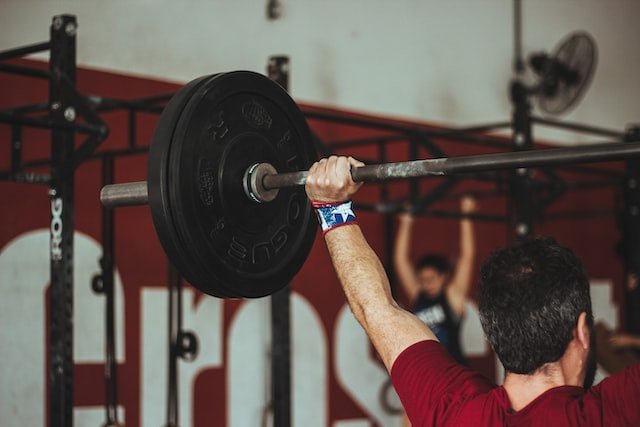
Why Is My Shoulder Press Getting Weaker? Vital Tips For Rapid Improvement
If you’ve been regularly performing the shoulder press exercise but have noticed a decline in strength, there are several potential explanations.
It leaves you to ask yourself “why is my shoulder press getting weaker?”
Have you changed anything in your routine? Are you using the same weight or performing the exercise with less intensity?
If you have made changes to your routine, they may be negatively affecting your strength.
Why is my shoulder press getting weaker?
There are several possible reasons why your shoulder press might be getting weaker over time. One possibility is that you are not doing the exercise correctly and/or your form is deteriorating. Another possibility is that you are not challenging yourself enough with the weight you are using, and as a result, your muscles are not getting stronger. What is your diet like, as this is very important for muscle development? Are you being consistent with your workouts or do you need to increase the volume to progress? Maybe you are are training your chest too close to shoulder day or you need to adjust your grip to get more out of the exercise? Finally, it is also possible that you are simply not giving your body enough time to recover between workouts, which can lead to fatigue and a decrease in strength.
Not having enough rest
Not having enough rest between workouts can lead to a decrease in strength. As you aren’t giving your body enough time to recover, you may start to see a decrease in performance.
This is one of the reasons why it’s important to have at least 1 day of rest in between workouts. More than a day’s rest is necessary if you worked on your chest and shoulders on two consecutive days.
As this would compromise the quality of your workouts, you may not be able to give your all which can lead to a decrease in strength.
Additionally, not getting enough sleep can also lead to a decrease in strength. It’s important to get at least 8 hours of sleep per night, and more if you are training hard.
Sleep is when your body repairs itself, and if you aren’t getting enough, your body won’t be able to recover fully which can lead to a decrease in strength.
If you think you aren’t getting enough rest, try adding an extra day of rest into your routine or make sure you are getting enough sleep.
Diet
Your diet is very important for muscle development. If you aren’t eating enough calories or the right types of foods, you won’t see the results you want.
Make sure you are eating enough protein as it is essential for muscle growth. Good sources of protein include lean meats, chicken, fish, eggs, and dairy. You should also be including carbohydrates in your diet as they are your body’s main source of energy. Good sources of carbohydrates include oats, rice, pasta, potatoes, and fruits.
Additionally, you need to make sure you are getting enough healthy fats as they are important for hormone production. Good sources of healthy fats include avocados, olive oil, nuts, and seeds.
You should also be drinking plenty of water as it is important for all bodily functions. Aim to drink 8 glasses of water per day.
If you think your diet might be the issue, try adding more protein, carbohydrates, and healthy fats to your diet. You might also want to consult a registered dietitian to ensure you are getting everything you need.
Training volume
If you are not challenging yourself enough with the weight you are using, your muscles will not get stronger. To see results, you need to be constantly pushing yourself and increasing the weight you are using.
If you have been using the same weight for a while and not seeing any results, it’s time to increase the weight. Try adding 5-10lbs to the weight you are using. If you are still not seeing results, you can continue to increase the weight until you do.
Additionally, you may need to increase the volume of your workouts. This means doing more sets and reps or increasing the amount of time you are working out.
If you are only doing 1 set of 8-12 reps, try doing 2-3 sets. If you are only working out for 30 minutes, try increasing it to 45 minutes.
You should also make sure you are giving yourself enough time to recover between workouts. If you are working out too close together, your body won’t have enough time to recover and you will start to see a decrease in strength.
If you think you need to increase the volume of your workouts, try adding an extra set or reps to your routine. You can also try increasing the amount of time you are working out.

Carrying injury
Another reason why your shoulder press may be getting weaker is because of an injury. If you have injured your shoulder, it may not be able to handle the same amount of weight as before.
If you have an injury, you may need to reduce the weight you are using or take a break from working out altogether. It’s important to listen to your body and not push yourself too hard.
If you think you have injured your shoulder, it’s important to see a doctor or physiotherapist to get it checked out. They will be able to give you a diagnosis and create a treatment plan to help you recover.
The shoulder joint is a very delicate area and it’s important to be careful when working out. If you are using too much weight or not using proper form, you can easily injure yourself.
Shoulder impingement – Shoulder impingement is a common cause of shoulder pain. It occurs when the tendons in your shoulder get irritated or inflamed. This can happen from overuse, injury, or poor form.
The way to get over this is by taking a break from working out, using lighter weights, and improving your form. You can also try some stretches and exercises that are designed to help with shoulder impingement.
Rotator cuff injury – The rotator cuff is a group of muscles and tendons that stabilize the shoulder joint. An injury to the rotator cuff can cause pain and weakness in the shoulder.
The most common way to treat a rotator cuff injury is with physical therapy. Physical therapy will help to stretch and strengthen the muscles around the shoulder joint. You may also need to use lighter weights and avoid certain exercises that put pressure on the rotator cuff.
Related: Why is my shoulder press so weak? All You Need to know for better results fast
Inadequate range of motion
Your shoulder press may be getting weaker because you don’t have enough overhead range of motion. This means that your shoulder joint isn’t able to move as freely as it should.
There are a few things that can cause this, such as tight muscles, bursitis, or arthritis. If you think you might have one of these conditions, it’s important to see a doctor or physiotherapist.
To improve your range of motion, you can try stretching and foam rolling. You can also try some exercises that are designed to improve your range of motion with resistance bands.
Improving your range of motion will take time and you may not see results overnight. However, if you stick with it, you should start to see an improvement in your shoulder press.
Need to change routine
If you have been doing the same shoulder press routine for a while, your body may have adapted to it and you are no longer seeing results.
To avoid this, you need to change up your routine every 4-6 weeks. This can mean adding more weight, doing more reps, or changing the exercises you are doing.
If you are stuck in a rut, try adding some variety to your routine. This will help to keep your body guessing and you will see better results.
Negatives are a great way to build strength. To do negatives, you lower the weight slowly and then raise it back up quickly.
This builds up muscle endurance and can help you to increase the weight you are using. Try doing 3-4 sets of 6-8 reps.
Make sure you have a spotter when doing negatives. This is because it can be difficult to control the weight on the way back up.
Mental fatigue
Mental fatigue can play a big role in strength training. When you are lifting weights, your brain is sending signals to your muscles telling them to move.
If you are feeling mentally tired, your muscles may not be able to work as hard. This can lead to a decrease in strength.
To avoid mental fatigue, make sure you are getting enough sleep and taking breaks when you need them. You should also try to focus on your form and technique.
If you are constantly thinking about how much weight you are lifting or how many reps you have to do, you will quickly become mentally fatigued.
Instead, try to focus on the movement and the muscle you are working on (mind-muscle connection). This will help you to stay focused and lift more weight.
You may be lifting too much weight. If you are using a weight that is too heavy, you will not be able to do the exercise with proper form.
This can lead to injury and will make the exercise less effective.

Poor form
If you are not using proper form, you will not be able to target the muscle you are trying to work. This can lead to injury and will make the exercise less effective.
To ensure you are using proper form, watch videos or ask a trainer for help. Once you have the correct form down, focus on using a slow and controlled movement.
This will help to ensure you are using the muscle you are trying to target and not relying on momentum.
You may be lifting too quickly. If you are lifting the weight too quickly, you will not be able to control it. This can lead to injury and will make the exercise less effective.
There are other factors to take into consideration when doing shoulder press…
Weak wrists and elbow flare – If your wrists are weak or your elbows are flared out, this can put extra stress on your shoulders and lead to injury
To avoid this, make sure your wrists are in line with your forearms and that your elbows are not flared out. Having your elbows flared out is a sign you need to widen your grip width on the bar.
If you have trouble keeping your wrists straight, try using a lighter weight and build up your wrist strength by doing other exercises such as reverse wrist curls.
You may also want to try using a thicker bar or using lifting straps to help take some of the stress off your wrists.
Lat engagement – If you are not engaging your lats or traps, this can lead to shoulder fatigue and injury.
To avoid this, make sure you are squeezing your shoulder blades together and activating your lats before you start.
Leaning back – If you lean too far back when doing shoulder press, this can put extra stress on your lower back.
To avoid this, make sure you keep a slight arch in your lower back and do not lean too far back. You should also focus on keeping your core engaged throughout the entire exercise.
If you find yourself leaning too far back, try using a lighter weight or placing your feet closer together.
Not engaging core or lower body – If you are not engaging your core or lower body, this can lead to injury or compromise any shoulder press gains.
To avoid this, make sure you keep your core engaged and your feet firmly planted on the ground. You should also focus on squeezing your glutes and keeping your lower body tight.
If you find yourself getting too loose, try using a lighter weight and focus on the quality of your form.
Your grip position needs adjusting – If your grip position is too wide or too narrow, this can lead to shoulder fatigue or injury.
To find the perfect grip position, start with your hands slightly wider than shoulder-width apart. From there, experiment with different grip widths until you find one that is comfortable for you.
You may also want to experiment with using a false grip or rotating your wrists so that your pinkies are higher than your thumbs.
Not breathing properly
If you are not breathing properly, this can lead to dizziness or lightheadedness. It is important to breathe in when you are lowering the weight and breathe out when you are pressing the weight up.
You may also want to try exhaling when you reach the hardest part of the lift. This will help to prevent you from getting lightheaded or dizzy.
Making sure you get into the rhythm of breathing in and out will help improve your performance and prevent any unwanted side effects.
People overlook breath work because it’s so simple, but it’s one of the most important things you can do to improve your performance.
Related: Why Are My Shoulders Never Sore? 16 Crucial Factors To Consider
Not being patient or consistent
If you are not being patient or consistent with your shoulder press, you will not see any gains. It is important to remember that gains take time and they will not happen overnight.
You need to be consistent with your exercise routine and make sure you are doing the shoulder press correctly. If you are not patient, you will likely give up before you see any results.
It is also important to remember that you will not see results if you only do the shoulder press once in a while. You need to make sure you are doing it on a regular basis if you want to see results.
Don’t forget the deltoid muscles aren’t a big muscle group like the pecs or lats. They’re small and take time to develop. If you want to see progress from your shoulder press, you must be patient and consistent with your plan.
Having consistency in your training, not just shoulder press but all your lifts will help improve your results and give you the motivation to keep going.

Weak upper body
If your upper body muscles are weak, this can lead to a decrease in the amount of weight you can press. It is important to make sure you are working all the muscles in your upper body so that they are equally strong.
Some exercises that can help to improve the strength of your upper body muscles are pull-ups, chin-ups, and rows.
Making sure your upper body muscles are strong will help to improve your shoulder press and help you to avoid injury.
Having a well-rounded fitness plan will help improve not only your shoulder press but all your lifts and help to prevent injury.
Related: Why Is Shoulder Press So Hard? All The Answers For Rapid Progress
Switch to dumbbells or sit it out
If you find that your shoulder press is getting weaker, you may want to switch to dumbbells. This can help to take the pressure off your shoulders and help you to focus on each side independently.
Dumbbells can also help to improve your range of motion and help to target each side of your body evenly.
If you find that your shoulder press is getting weaker, don’t be afraid to switch to dumbbells. This can help you to focus on each side of your body evenly and help to improve your range of motion.
If you aren’t having any joy standing up when doing shoulder press, then have you considered sitting down? This can help to take the pressure off your lower back and help you to focus on your shoulders.
Sitting down can also help to improve your range of motion and help to target each side of your body evenly.
If you find that your shoulder press is getting weaker, don’t be afraid to switch to dumbbells or sit down. This can help you to focus on each side of your body evenly and help to improve your range of motion.
Final thoughts…
If you find that your shoulder press is getting weaker, it is important to identify the reason why. Once you have identified the reason, you can then take steps to correct it.
If you want to be successful with the shoulder press, make sure to stay consistent and patient. If your upper body muscles are weak, make sure you are working all the muscles in your upper body equally.
Make sure you engage your core and glutes to stabilize your body and avoid injury, keeping your body tight when doing shoulder press is crucial to progress.
If you find that your shoulder press is getting weaker, don’t be afraid to switch to dumbbells or sit down.
Hopefully, some of these tips will help you to improve your shoulder press and help you to avoid injury.
Have your experienced this issue when working your shoulders, how did you get back on track? Let me know in the comments section below.


